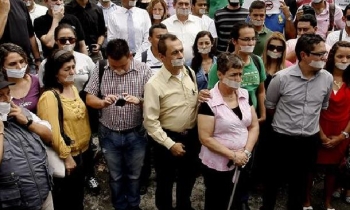A group of Ugandans identified as homosexual in a newspaper article headlined "Hang Them" have won damages and a court injunction ordering the paper not to repeat the exercise, human rights groups said Monday, according to The Guardian.
A high court judge ruled that the story in the Rolling Stone newspaper, which printed addresses and photographs of some of the 100 people it named as "Uganda's top homos", violated their constitutional rights to privacy and safety. The court awarded the three plaintiffs in whose names the case was launched just over £400 each in damages, the Civil Society Coalition on Human Rights and Constitutional Law in Uganda said in a statement.
The details: [Link]
Rights groups warned that the article in October in the new, small-circulation weekly title put the lives of gay people in danger, saying that at least one woman named in the story had been forced to leave her home after neighbours pelted it with stones.The front page of Rolling Stone, started by journalism graduates from Makerere University in Kampala, claimed that the country's homosexual community aimed to "recruit 1,000,000 children by 2012", and that parents "face heart-breaks [sic] as homos raids schools". Inside, a headline read: "Hang them; They are after our kids!!"
It was published shortly before the first anniversary of the introduction to Uganda's parliament of a controversial anti-homosexuality bill calling for the death penalty for those convicted of repeated same-sex relations. Inspired at least in part by a group of US evangelicals with close links to Uganda, the bill stalled after an international outcry, though it has not been scrapped.
The Civil Society Coalition said it had filed a complaint against the newspaper on behalf of three members, and the high court had ordered Rolling Stone not to publish any further such stories. According to the group the court ruling, released today, noted that the issue was not homosexuality but the "fundamental rights and freedoms" of those named, particularly through the incitement to violence.
Adrian Jjuuko, from the group, said: "The ruling firmly establishes the principle that constitutionally protected rights belong to all Ugandans, whatever their perceived sexuality."
Kasha Jacqueline, one of the applicants, said: "While this injunction is a positive step for gay people in Uganda, the fact remains that the government of Uganda has for long been mute about the discrimination, threats and violence faced by LGBTI [lesbian, gay, bisexual, transgender, inter-sex] people in Uganda."
According to gay activists in Uganda, the anti-homosexuality bill fuelled hate speech and created a climate of fear, with the media playing a strong role. The tabloid Red Pepper had previously "outed" dozens of gay people.
At the time of the Rolling Stone story the paper's managing editor, Giles Muhame, told the Guardian that it was his duty as a journalist to "expose the evil in our society".









